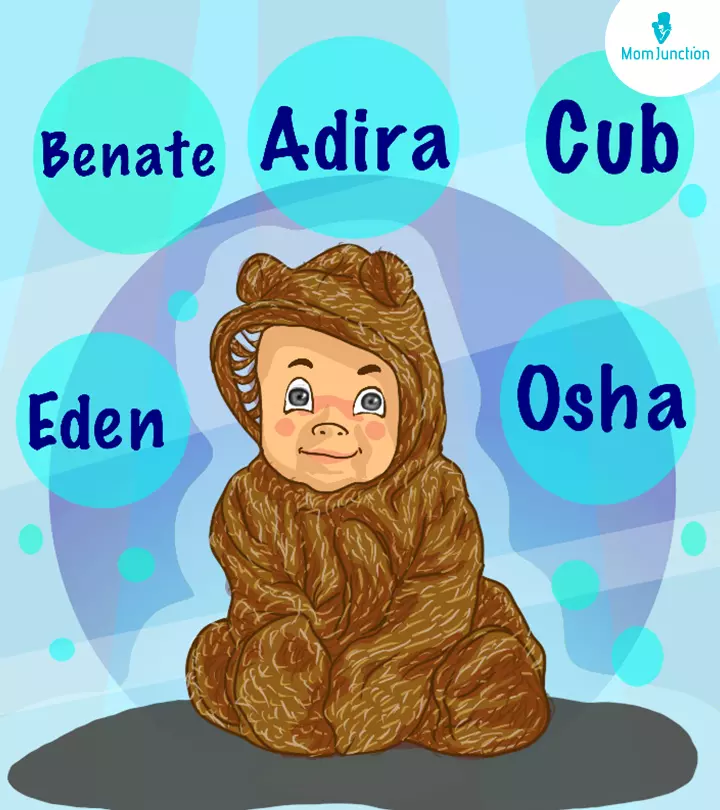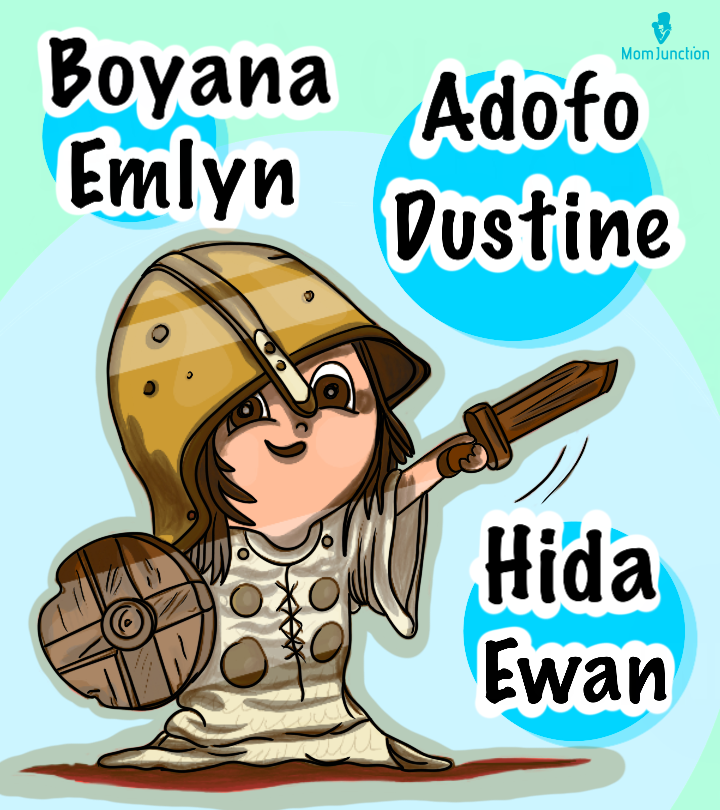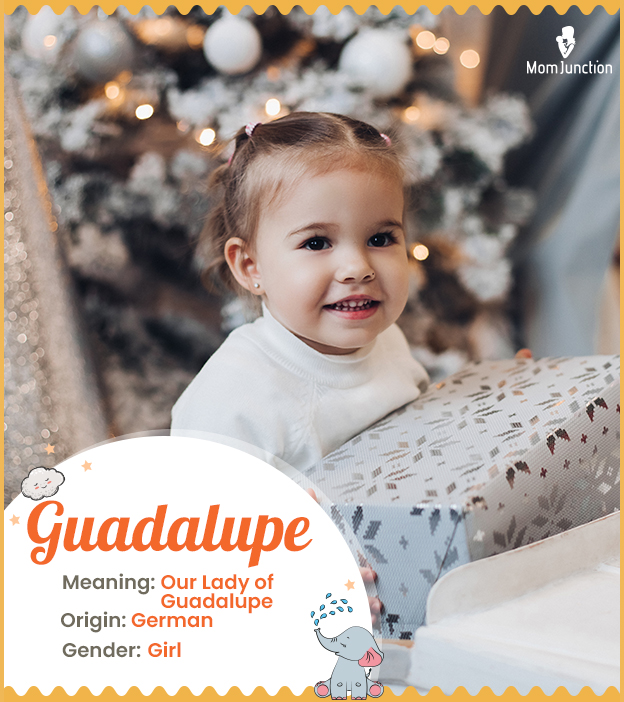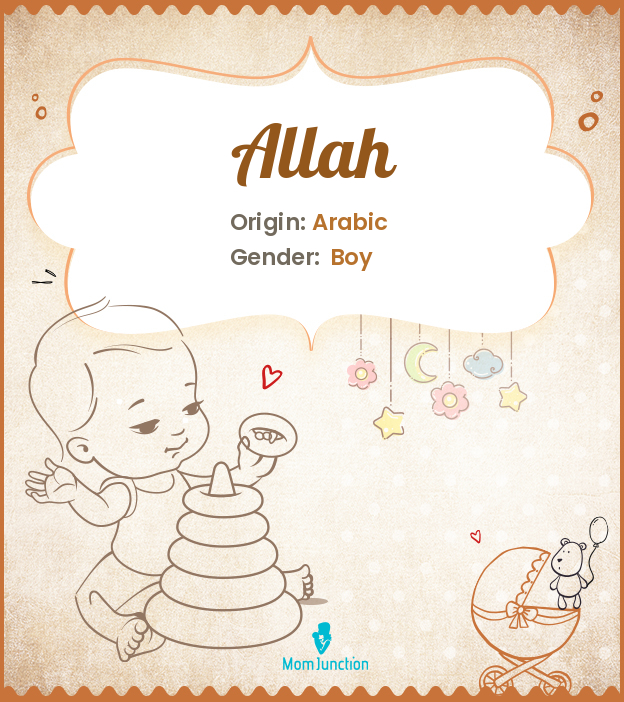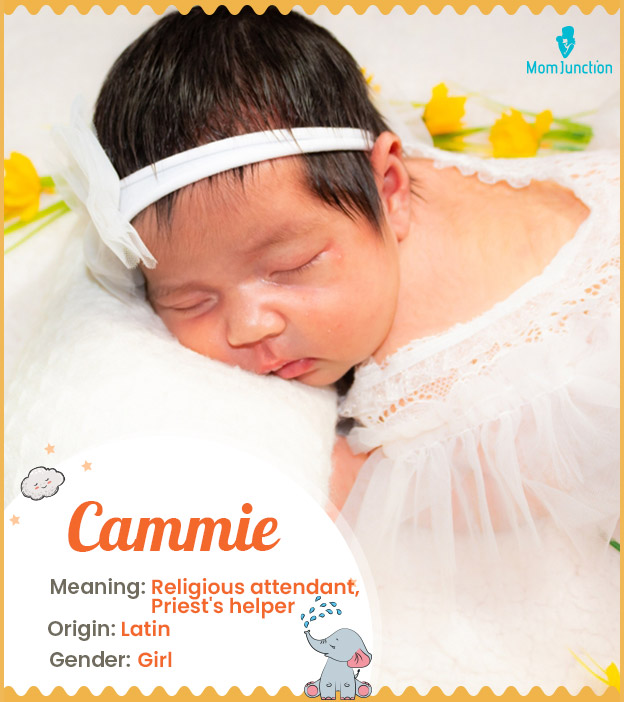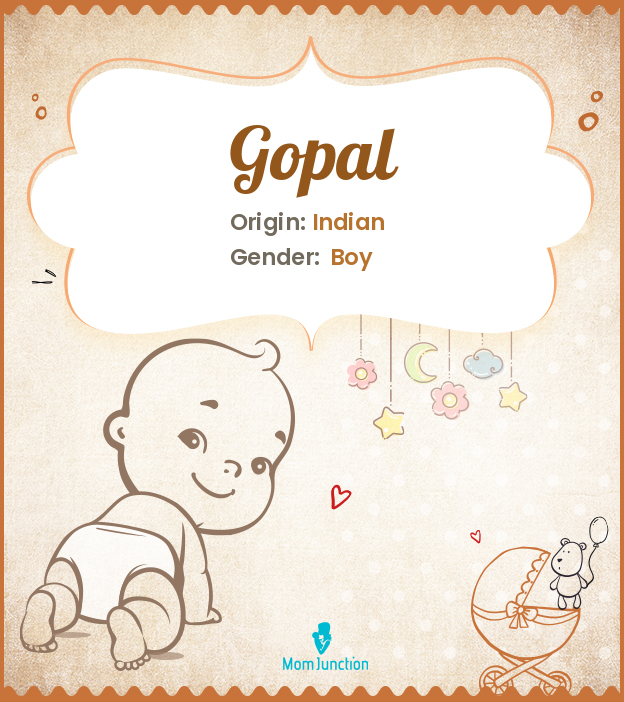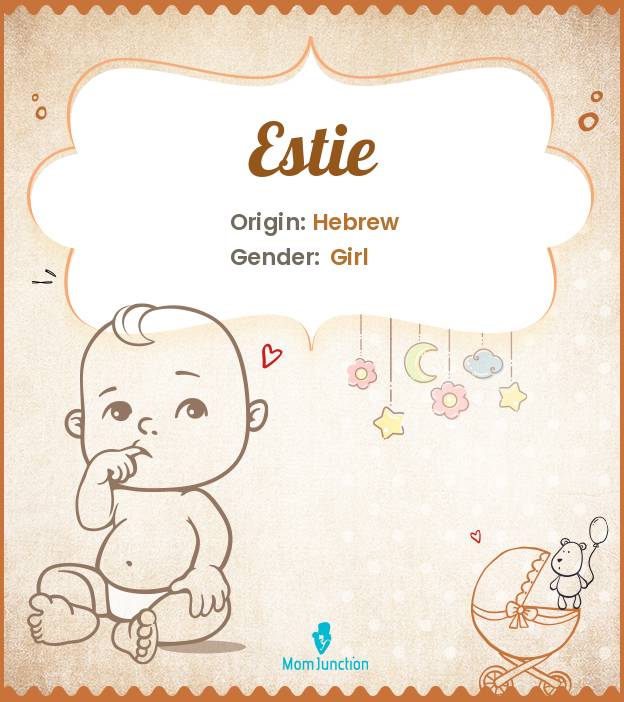173 Aramaic Baby Names With Ancient Charm
Ancient elegance and timeless beauty distinguish the allure of our evergreen list.
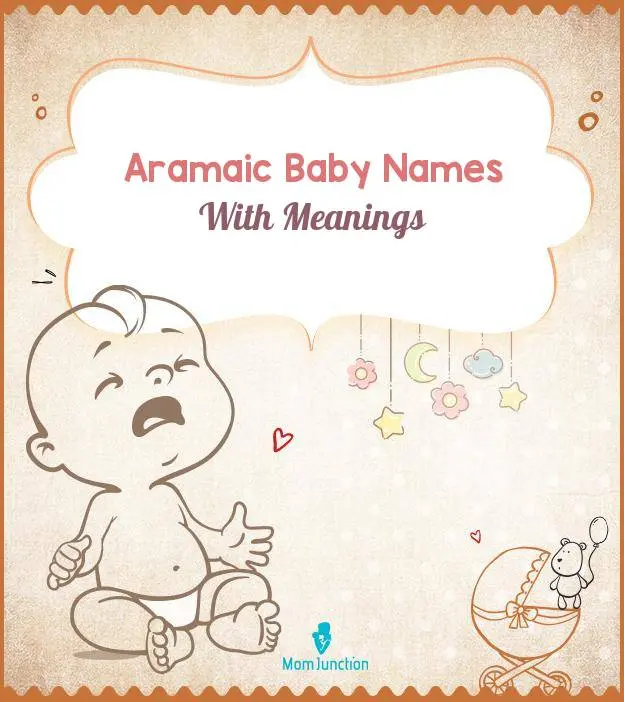
Illustration: MomJunction Design Team
When your baby is unique and one of a kind, why should the names mean old-fashioned and uninspiring? Especially when you have a plethora of Aramaic baby names to choose from. Nobody wants their children to have boring names. Unique and fun names can add a definite charm to a child’s personality. And when you’re looking for a unique name, what better than looking into the treasure trove of Aramaic baby names? Aramaic, also known as Assyrian, is a form of Jewish language spoken widely by two million people of the Assyrian diaspora spread across the Middle East and North Africa. The Assyrians were a group of people who first spoke and wrote in Akkadian, but later switched to the more convenient Aramaic language. Tiglath Pileser III made Aramaic the primary language of the empire instead of Akkadian, and Aramaic continued to be used as a written language (1). The Aramaic baby names are primarily based on the religious context because of the presence of different religious communities. Originally, Assyrian names consisted of a first name and a patronymic name. But Assyrians have now begun using surnames. Interestingly, the surnames used now were the first names of grandparents who signed the surname laws in the 1920s. This is why many Aramaic last names are also used as first names. Bart is a popular name from the Aramaic language and means 'son of Tolmai' or 'son of the one who abounds in furrows'. Gethsemane, on the other hand, is a unisex name that means 'estate of an olive tree'. It's a biblical name that's associated with the Garden of Gethsemane, where Jesus prayed before his crucifixion. Xiomara is a girl's name that has a unique meaning. It's a variation of the name Xiamara which means 'joyful deer.' The Assyrians also shortened the personal names to just a few syllables for the nickname. Browse through our collection of Aramaic baby names with meanings below.
On This Page
Browse Baby Names By Gender
Browse Baby Names By Alphabet
| Name | Gender | Meaning | |
|---|---|---|---|
|
|
Twin | ||
|
|
Son of the Earth; Formed of earth; Red; One from the soil | ||
|
|
Harmony; Offering; Beautiful; Exalted; Precious; Child | ||
|
|
Harmony; Offering; Beautiful; Exalted; Precious; Child | ||
|
|
Heart; Gift of God | ||
|
|
House of figs | ||
|
|
Mistress; Lady | ||
|
|
Twin | ||
|
|
Twin | ||
|
|
Fruitful; Productive | ||
|
|
Harmony; Offering; Beautiful; Exalted; Precious; Child | ||
|
|
Pearl; Lady; Mistress; Beloved; Sea of bitterness | ||
|
|
Peace; Sun | ||
|
|
Gazelle | ||
|
|
Fair; Pine tree; Lights | ||
|
|
Little rock; Handsome; Precious; My child; Harmony; Elevated | ||
|
|
Twin; Honest; Innocent; Naive | ||
|
|
Son of Thomas | ||
|
|
Fruitful | ||
|
|
Park keeper; Park enclosure; Stone | ||
|
|
Twin | ||
|
|
Limit; Boundary, Frontier; Iinfinite; Treasure; Treasure; Precious; collection of valuable objects; Flat-nosed | ||
|
|
My God is an oath; House of figs | ||
|
|
Son Of Talmai | ||
|
|
Little girl; Young girl | ||
|
|
Light; Bloom; Blossom; | ||
|
|
Educated in the Bible; Gold | ||
|
|
Twin; Strong; Energetic; Courageous | ||
|
|
Incense; Fragrance; Knot; To steam | ||
|
|
Little female bear; Wisdom; Knowledge; Harmony; Offering; Beautiful; Exalted; Precious; Child; Light | ||
|
|
Educated In the Bible; Gold | ||
|
|
Joyful deer | ||
|
|
Date palm; Twin | ||
|
|
Strength, power, leader | ||
|
|
Heart | ||
|
|
Son of Adam; Son of the Earth; Formed of earth; Red | ||
|
|
Son of encouragement; Son of the Prophet | ||
|
|
Breeze; Grandfather; Pole | ||
|
|
Earth; Soil; Ground; Red; Formed of earth | ||
|
|
Twin | ||
|
|
Antimony | ||
|
|
My God; Divine; Celestial; Godly | ||
|
|
A stone or a rock | ||
|
|
Boatman; One who lives near lush pasture; Son of Talmai | ||
|
|
Yahweh is exalted; The Lord is elevated; Afflicted | ||
|
|
Old man; Granfather; Saint who was a trainer of young monks | ||
|
|
Heart; Gift of God | ||
|
|
Son of Talmai | ||
|
|
Air; Spirit; Treetop; Father of many; Elf ruler | ||
|
|
The handsome one; To extend; Beautiful | ||
|
|
Hammer | ||
|
|
Twin | ||
|
|
Fetter; Armor; Weapon | ||
|
|
Servant of Nebo | ||
|
|
Light | ||
|
|
One who has no luck | ||
|
|
Son of Talmai; Farmer | ||
|
|
Son of Talmai; Farmer's Son | ||
|
|
House of figs | ||
|
|
young eagle | ||
|
|
Air; Atmosphere; Spirit; Treetop | ||
|
|
Father; Priest; Man | ||
|
|
Son; Child; Cereal or grain; Gate; Barrier | ||
|
|
Help; Support; Intellectual | ||
|
|
Son of encouragement; Son of the Prophet; Son of consolation | ||
|
|
Lady; Mistress | ||
|
|
Father; Husband; Breath; Noble | ||
|
|
NA | ||
|
|
The god of war; Mars; Dedicated to Mars; Lady; Mistress | ||
|
|
Little girl; Young girl | ||
|
|
Sea; Lord; Horse; Firm; Month of March | ||
|
|
Italian of thaddeus; A gift of God | ||
|
|
Twin | ||
|
|
A twin; One of the two born children | ||
|
|
From the Birch tree meadow; Woodland clearing; Son of Talmai; Farmer | ||
|
|
Son of Talmai | ||
|
|
Precious; Child; Light; Harmony | ||
|
|
Of fire | ||
|
|
Son of Talmai | ||
|
|
My light; My fire; World | ||
|
|
Old man; Granfather | ||
|
|
New victory; Twin | ||
|
|
Twin | ||
|
|
Twin | ||
|
|
Earth; Red; Formed of earth | ||
|
|
Son of the Prophet; Son of consolation; A strong and brave bear | ||
|
|
Father; Priest; Eternal | ||
|
|
Son of Talmai; Bright | ||
|
|
Son of Talmai; Farmer's Son | ||
|
|
A stone or a rock | ||
|
|
Hot spring | ||
|
|
Lighten; Rivers | ||
|
|
A variant of Matthias; Gift of God | ||
|
|
Twin | ||
|
|
Calm; Dignified; Grape | ||
|
|
Land of Egypt; Siege; Distress; Easteners | ||
|
|
Heart; Gift of God | ||
|
|
A short form of Thomas; Twin | ||
|
|
Gazelle; Shining; Brilliant; String | ||
|
|
Twin | ||
Aramaic baby names offer a unique and meaningful option for parents looking to name their newborn. The list of names above showcases several options, from traditional biblical names to modern choices. Each name carries a special meaning, allowing parents to choose a name that reflects their values and hopes for their child. This resource serves as a helpful guide for parents who want to find the perfect name for their little ones.
Frequently Asked Questions
1. What is the history and origin of Aramaic baby names?
Modern Aramaic and Hebrew names are derived from the Hebrew Bible, offering a rich historical background and literature. Although the languages share similarities, they belong to different religious communities. Aramaic baby names have a strong foundation in religion and the presence of God. They typically consist of a first name and a patronymic name. In modern times, Aramaic baby names have been simplified to ensure ease of use and pronunciation. However, they still have religious significance.
2. How do Aramaic baby names differ from other Middle Eastern names?
Aramaic baby names differ from other Middle Eastern names due to their distinct linguistic and cultural origins, rooted in the Assyrian community. They carry a unique religious and historical significance, reflecting the Aramaic language and its influence on the region. While this cannot be found in Middle Eastern names, they usually originate from Arabic. For example, it is Maria in Aramaic and Mariam or Maryam in the Middle East.
3. What cultural significance do Aramaic baby names hold?
Aramaic baby names hold significant cultural importance as they are rooted in the ancient Assyrian civilization and the Aramaic language. They connect individuals to their Assyrian heritage, preserving cultural identity and reinforcing a sense of belonging within the community. These names also reflect religious and historical traditions, serving as a link to the rich cultural tapestry of the Assyrian people.
Infographic: Amazing Aramaic Baby Names
Aramaic names are unique and have deep historical and cultural significance. In this infographic, we will look at some of the most popular Aramaic names for boys and girls and their meanings. Whether you're looking for a name for your newborn or just interested in learning more about Aramaic culture, this infographic can be an interesting read.
Illustration: Momjunction Design Team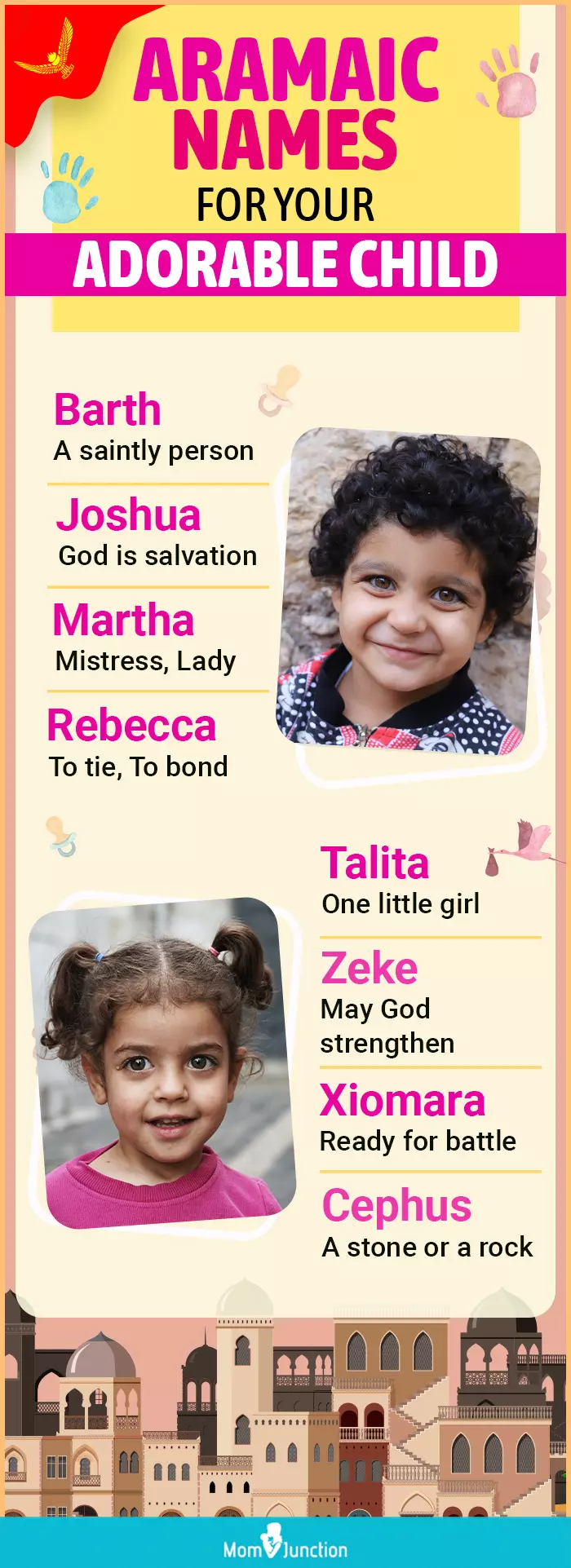
References
- Assyria; World History Encyclopedia.
https://www.worldhistory.org/assyria/
Look Up For Many More Names
Do you have a name in mind and want to know more about it? Or want to find names belonging to a particular origin, religion, or having a specific meaning? Use our search tool below to explore more baby names with different combinations.

Community Experiences
Join the conversation and become a part of our nurturing community! Share your stories, experiences, and insights to connect with fellow parents.
Read full bio of Trisha Chakraborty
Read full bio of Shikha Thakur
Read full bio of Nisha Bharatan






